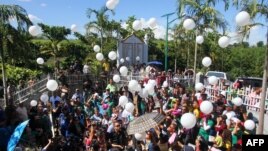24 November, 2015
Six years after almost 60 people were killed in the southern Philippines during elections, no one has been sentenced to prison.
One of the main suspects has died. One of his sons -- who was accused in the attacks -- is running for political office.
The attack happened in Maguindanao province in the southern island of Mindanao. At least 57 people were killed. At least half were reporters, says the National Union of Journalists of the Philippines.

Relatives and supporters of the victims of the infamouse Maguindanao massacre, including Philippine Justice Secretary Leila de Lima (C-partly hidden), release white balloons into the air during the fifth-year anniversary commemoration at the massacre site in Ampatuan, Maguindanao province, on the southern Philippine island of Mindanao, on November 23, 2014. Senior Philippine officials vowed on November 23 to deliver justice as the nation marked the fifth anniversary of the country's worst political massacre that left 58 dead, including 32 journalists. (AFP/Mark Navales)
Alwyn Alburo is the vice chairman of the union. He says the political climate in the area has not changed since the attack.
"Political patronage, warlord-ism, private armies, electoral violence, electoral dishonesty -- these are all still present. And even the corruption of our colleagues in the media -- these are all meant to just further that status quo of those who are in power."
Union officials say 196 people are suspected of planning or carrying out the attacks. They are not optimistic that the attackers will be punished soon, they say. But they will continue to talk about the attack and help the victims' families.
On November 23, 2009, more than 100 men shot at a group of reporters and supporters of Esmael Mangudadatu. He was a candidate for governor of Maguindanao.
He is now in his second term as governor.
Mangudadatu sent his wife and sisters to the area to deliver his registration as a candidate. The reporters were there to document the event.
The victims were shot on a mountainside and buried in a large grave, says the Committee to Protect Journalists. The grave was dug using government-owned construction equipment, the committee reports.
The committee says other reporters have been attacked in the Philippines since then. It said the killing of reporters often goes unpunished. It said this has affected reporters' work.
Members of a group that was fighting to control the province have been charged with the attack.
Officials say Andal Ampatuan Jr. led the group that killed. His father, three brothers and another family member have been charged with planning the attack.
The family members deny being involved in the attack. They have asked to be released from jail, but most of their requests have been denied.
Andal Ampatuan Sr. died in July. Earlier this year, one of his sons -- Sajid Islam Ampatuan -- was released from jail after paying bail. He is now campaigning to become mayor of Shariff Aguak, the capital of Maguindanao.
Alwyn Alburo says President Benigno Aquino is not pushing enough for the attackers to be punished.
Edwin Lacierda is a spokesman for the president. He called Alburo's accusation "unfair." Lacierda says the courts are dealing with the case.
He said the president hopes a decision can be reached in the case before his term ends in July.
Political expert Ramon Casiple said he is optimistic that the alleged attackers and planners will be punished. He notes that their requests for bail are being challenged. He said the main problem is that some criminals in his country are not punished for 10 years after their illegal acts.
I'm Christopher Jones-Cruise.
Correspondent Simone Orendain reported this story from Manila. Christopher Jones-Cruise adapted it into VOA Learning English. Kathleen Struck was the editor.
We want to hear from you. Write to us in the Comments section or on 51VOA.COM.
Words in This Story
patronage – n. the power to give jobs or provide other help to people as a reward for their support (often used disapprovingly)
warlord – n. a leader of a military group who is not officially recognized and who fights against other leaders, groups or governments
status quo – n. the current situation; the way things are now
registration – n. the act or process of entering names on an official list
bail – n. an amount of money given to a court to allow a prisoner to leave jail and return later for a trial
optimistic - adj. hopeful; a feeling that good things will happen
deliver - v. to take something to a place or to a person
grave - n. burial grounds; a place where remains are buried
alleged - adj. accused to having done something; reported